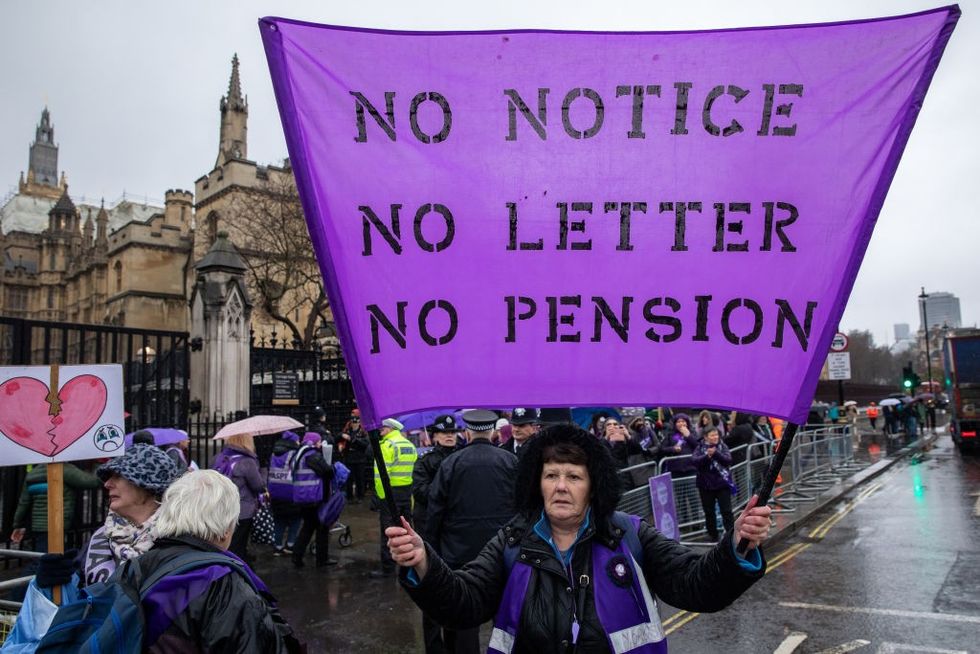Waspi women suffer 'disappointing' blow as DWP confirm another delay in compensation bill
The second reading of the State Pension Age (Compensation) Bill will now be held on May 17
The second reading of the State Pension Age (Compensation) Bill has been pushed back by almost a month and will now take place on May 17
Don't Miss
Most Read
Trending on GB News
Waspi women have been left waiting an extra month for a decision on compensation as the debate in parliament was delayed.
The second reading of the State Pension Age (Compensation) Bill was set to take place in the House of Commons yesterday, however it will now be held on May 17.
The equalisation of the state pension age between men and women has resulted in many women born in the 1950s getting less in retirement than they had expected.
Campaigners are urging Government ministers to take action over a historic “injustice” resulting from changes to the state pension age for women.
Waspi women argue that the Government did not give some women adequate time to make alternative plans after finding out the state pension age would be pushed back.
The Women Against State Pension Inequality (Waspi) campaign is demanding compensation for up to 3.6million women following the publication of the Parliamentary and Health Service Ombudsman’s (PHSO) final report last month.

The WASPI campaign wants payouts of £10,000 or more
GETTY
As part of the PHSO’s report, it was recommended that women born in the 1950s were awarded a Level 4 amount of compensation between £1,000 and £2,950, but the WASPI campaign wants payouts of £10,000 or more.
Following the delay of the bill in parliament, Alan Brown, the SNP MP who introduced the bill said: "I am disappointed I have had to reschedule the potential second reading of the bill.
"This is proof that the way Westminster operates with the Government of the day being able to dictate timings needs to be overhauled."
The state pension age for women used to be 60, while for men it used to be 65. However the 1995 Pensions Act aimed to increase the state pension age for women and gradually make it equal to a man's state pension age.
Initially it was announced that the state pension age for women would increase to 65 between 2010 and 2020.
However, this was accelerated under the 2011 Pensions Act and the new state pension age of 65 for women was brought forward to 2018.
Both men and women saw their state pension age increase to 66 in October 2020.
Waspi has highlighted that 3.6 million women were affected after they were not properly informed about increases to their state pension age.
Campaign groups and supporters in Parliament are calling on Commons Leader Penny Mourdant and Work and Pensions Secretary Mel Stride to address the concerns raised the ombudsman.
So far, over 225,000 people have signed an online open letter to Mordaunt, calling for debate and vote as soon as possible.
Angela Madden, the chair of the Women Against State Pension Inequality (Waspi) campaign, outlined why she believes women are being “failed badly” by the Government.
She explained: “The Parliamentary Ombudsman’s report was published nearly one month ago and with no timeline for the Government’s compensation proposals yet published, it appears ministers have gone into hiding.
LATEST DEVELOPMENTS:
“The report contains three straightforward conclusions: the DWP failed us very badly; Waspi women should be compensated; and Parliament should intervene to set up a scheme.
“The Government should listen to the views of the Commons and the country – all MPs must be given an urgent debate and vote before the summer recess so we can finally put an end to this injustice.”
A DWP spokesperson said: “We are considering the Ombudsman’s report and will respond in due course, having cooperated fully throughout this investigation.
“The government has always been committed to supporting all pensioners in a sustainable way that gives them a dignified retirement whilst also being fair to them and taxpayers.
“The State Pension is the foundation of income in retirement and will remain so as we delivered a further 8.5 per cent rise this month, increasing the state pension for 12 million pensioners. This has seen the full rate of the new state pension rise by £900."







